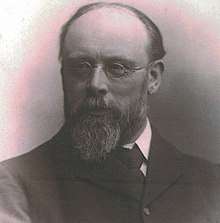James Cooksey Culwick
Dr James Cooksey Culwick (28 April 1845 – 5 October 1907) was an English musician who is most well known for being Organist of the Chapel Royal and founding the Orpheus Choir.[1] The Culwick Choral Society is both named in honour of Culwick and traces its lineage to the Orpheus Choir.[2]
James Cooksey Culwick | |
|---|---|
 Church Organist/Musician/Composer | |
| Born | April 28, 1845 |
| Died | October 5, 1907 (aged 62) Upper Mount Street, Dublin |
| Occupation | Church organist, choral director |
| Children |
|
Biography
Early life
Culwick was born in West Bromwich, Staffordshire. At the age of fourteen he became a chorister in Lichfield Cathedral where his father, also a musician, was a lay clerk. He took lessons from the then Cathedral organist, Thomas Bedsmore, and was later appointed assistant organist. He subsequently took the role of church organist at the Church of St Chad, Lichfield.[1]
Ireland
Culwick relocated to Ireland in 1866, filling the position of organist at Parsonstown, King's County, before moving to Bray Parish Church in 1870 and then St Ann's Church, Dawson Street in 1871.[1] In 1881 he was appointed as organist to the Chapel Royal at Dublin Castle. A 1907 Irish Times obituary states that he made a 'high reputation' as a teacher at an early stage in his career.[1]
Culwick founded a private society, known as 'Harmonie' which attracted amateur singers and musicians, and subsequently founded the Orpheus Choir.
He was involved in the establishment of the Feis Ceoil, and from 1913 the Culwick Cup was awarded in his honour in the choral competitions.[1][3] With Sir Robert Prescott Stewart, he helped establish a branch of the Incorporated Society of Musicians in Dublin.[1]
Marriage and children
Culwick was married twice, first to Alice Mary Harrison of Lichfield (died 1875), then to Mary Richardson, 'a daughter of the late Dr Benjamin Richardson of Dublin'.[1] His children were:
- Arthur Culwick (born 1873), clergyman and sometime incumbent of Crinken Church, Bray[1]
- Florence Culwick (1877 – 1929) Conductor and choir director
Death
Culwick died at his home, 57 Upper Mount Street, Dublin, having been ill for four weeks.[1]
Selected works
Works include:
- Piano Quartet in E-flat (1880)
- 'The Legend of Stauffenberg' - A Dramatic Cantata (libretto by Dr. John Todhunter) (circa. 1890)
- 'Handel's "Messiah": Discovery of the Original Word-Book used at the first performance in Dublin, April 13, 1742: With Some Notes':Which, according to Culwick's obituary, put to an end the controversy over whether the original performance of the Messiah had taken place in Dublin.[1]
- 'Fifty Years in the Life of a Great Irish Musician' - Conference Paper on Sir Robert Stewart presented at the Incorporated Society of Musicians in Dublin Conference, Dublin 1902.
Honours, decorations, awards and distinctions
Culwick was conferred the degree of Doctor in Music, honoris causa by the University of Dublin on June 29, 1893.
In 1909, a memorial tablet was placed in the South Choir Aisle of St Patrick's Cathedral, Dublin in memory of Dr Culwick for his work as organist and choir master of the Chapel Royal. The memorial consists of a bronze portrait medallion, with marble frame, designed by Oliver Sheppard and Sir Thomas Drew respectively. It states:
James Cooksey Culwick. Mus.Doc.
Trinity College, Dublin.
Born 28th April 1845. Died 5th October, 1907.
A learned musician. A true artist. A good man.
This tablet is erected in affectionate remembrance by members and supporters of the Orpheus Choral Society, of which he was the founder and conductor, 1896–1907.[4]
References/Notes and references
- "Dr. J. C. Culwick". The Irish Times. 7 October 1907. p. 5. Retrieved 17 May 2020.
- Clare, Jane; O'Connell, Magdalen; Simmons, Ann, eds. (1998). The Culwick Choral Society celebrates one hundred years 1898–1998. The Culwick Choral Society.
- "Feis Ceoil Association". The Irish Times. 19 April 1913. p. 5. Retrieved 19 May 2020.
- "Culwick Memorial Tablet". The Irish Times. 20 May 1909. p. 6. Retrieved 19 May 2020.
External links
- www.culwick.org: Website of the Culwick Choral Society.